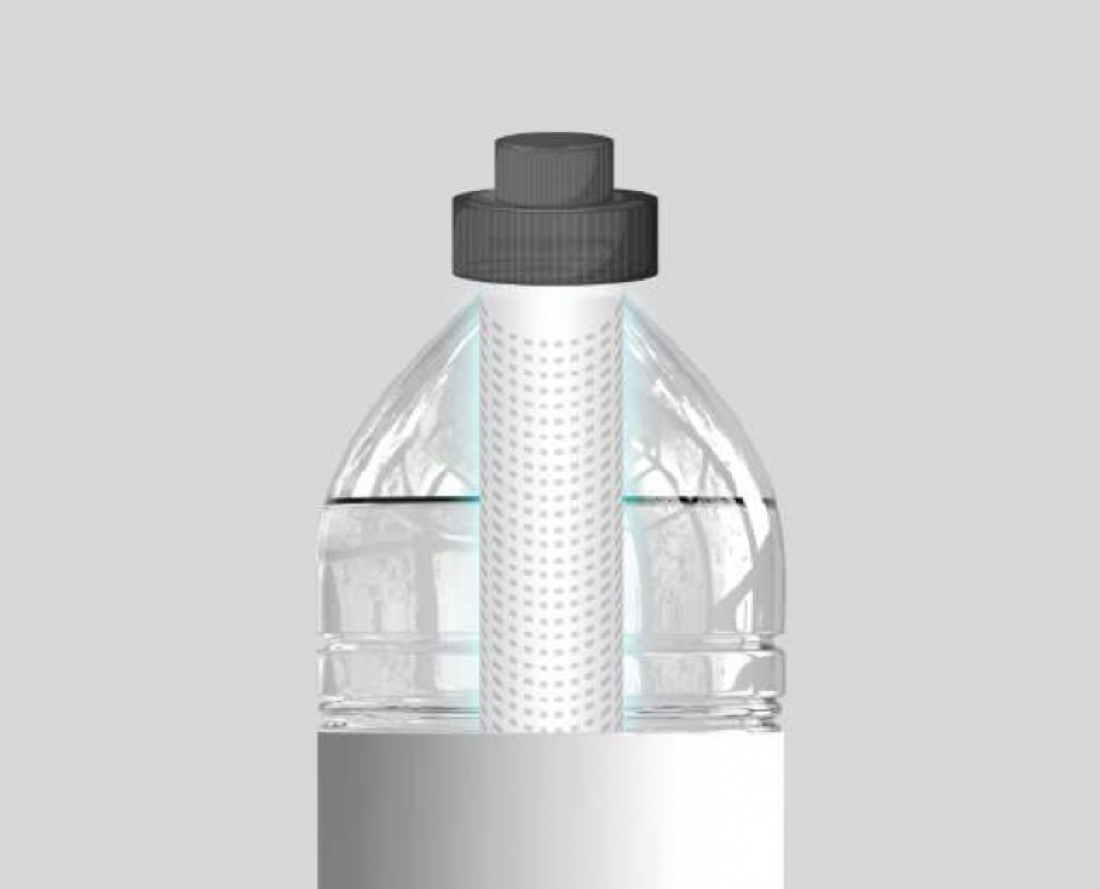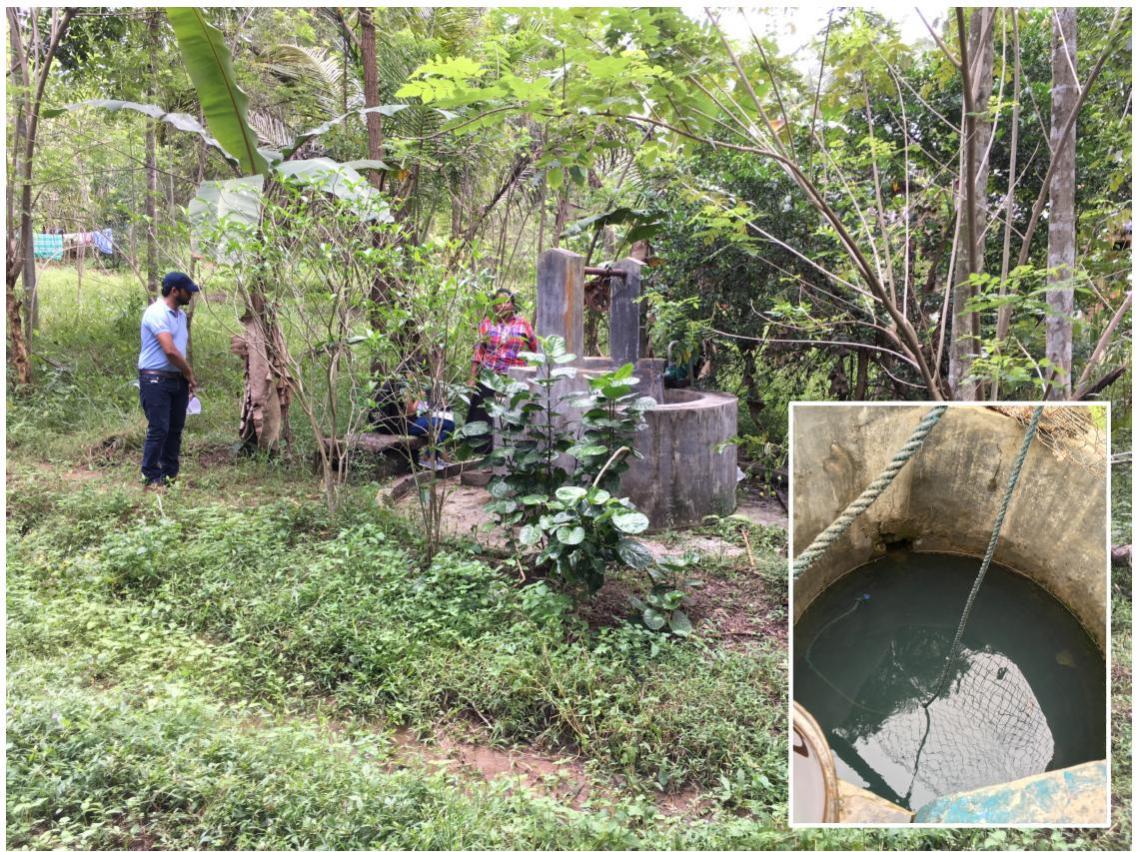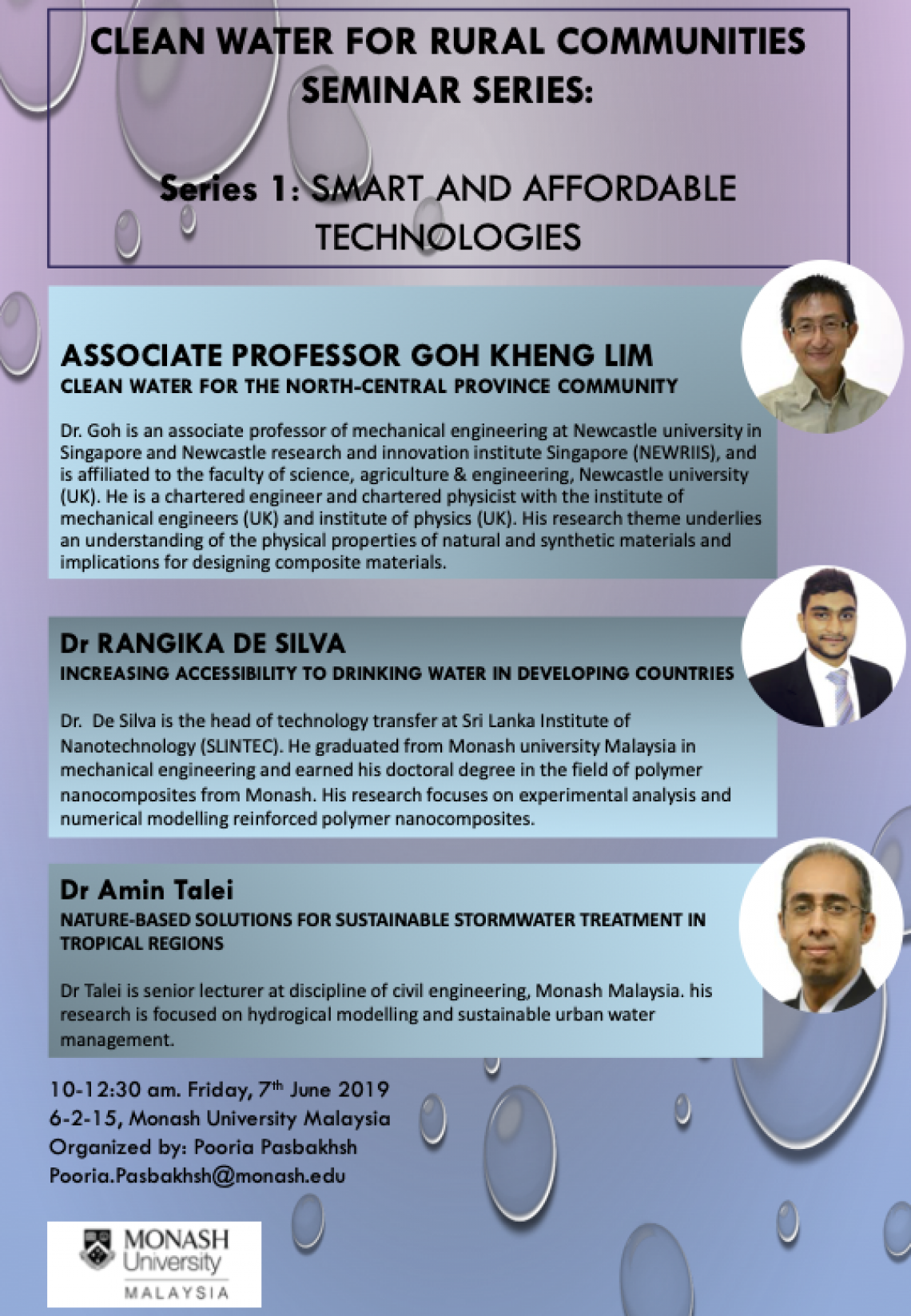An Illustration of the Poseidon Low Cost Water Bottle Filter Unit that Fits Any Standard PET Water Bottle
Initiated in 2012 by undergraduate student Maziyar Makaremi, with final-year project supervisor Dr Pooria Pasbakhsh, through Monash University's Undergraduate Research Opportunity (UROP), the Poseidon project (or simply known as 'Clean Drinking Water' project) gained momentum with potential applications in helping water-stressed local communities in Sri Lanka. The team expanded to include SLINTEC, a private-public research institute from Sri Lanka and Newcastle University (UK and Singapore) across continents. Consequently, the research expanded and the research found publication in esteemed journals: The Journal of Physical Chemistry C (American Chemical Society) in 2015 [1] and RSC Advances (the Royal Society of Chemistry) in 2016 [2]. This was followed by further publications in Elsevier journals, featuring advanced micromechanical system testing of the filters [3, 4].
In 2017, led by Dr Kheng Lim Goh of Newcastle University in Singapore, with co-PI Dr Vladimir Zivkovic of Newcastle University UK, the team secured additional funding from EPSRC Partnering for GCRF, allowing for prototypes of the filter device, hereafter known as 'Poseidon filter unit', to be fabricated and initial fielding sampling and testing. Dr Goh led a two-week expedition to the North Central region of Sri Lanka to conduct the first field study. Samples of the ground water collected were tested in the labs at SLINTEC.
In 2018, Dr Pooria Pasbakhsh, Monash University Malaysia, obtaining a mobility grant funding, allowing for a series of workshop to be run where issues of current interest were presented and debated, attended by NGOs, industry professionals as well as academics. Several important ideas were developed during the discussion, including the issue of tracking the filtration devices when they are enroute to the distribution sites of the disaster area, to ensure that help is directed successfully to the disaster area, and the long term environmental impact of these filtration devices.
Photo of Dr Pooria Pasbakhsh (right) and Dr Rangika De Silva (left) sharing ideas on the Poseidon unit at SLINTEC
While numerous water filters populate the market, the Poseidon filter unit distinguishes itself with a compact design, remarkably cost-effective compared to similar alternatives. Its adaptability to attach to various water bottles makes it suitable for rural disaster-stricken regions lacking access. Despite the extensive filter variety available, the Poseidon filter unit's affordability underscores its potential for success. It aligns with industry and World Health Organization standards, effectively eliminating bacteria, BPA, and heavy metals. Particularly noteworthy is its focus on heavy metal removal in portable water bottles, an aspect often overlooked. This is crucial in countries like Sri Lanka and Bangladesh where heavy metal contamination poses a significant concern.
The team aims to ensure this solution is both affordable and lightweight, making widespread public distribution feasible. Unlike existing water filters, its primary focus is disaster management, providing clean water support for up to two to three days following a disaster. Contaminated groundwater requires intricate filtration to become potable, addressing impurities like microparticles, nanoparticles, heavy metals, bacteria, sand, and mud. Odor, chlorine, and BPA are also common targets for removal, often achieved through the inclusion of activated carbon, which is cost-effective for improving taste and odor. Constructed from electrospun nanofiber and reinforced with various nanomaterials, the filters offer impressive thermal, mechanical, and antibacterial performance. With a capacity to filter 1000 liters of water per unit, the Poseidon filter unit enables relief providers to offer water filters in lieu of bottled water. The affected individuals need only affix the portable filtration device to their existing water bottles.
Photo of SLINTEC researchers collecting water samples from the wells, using the Poseidon filter unit, at a local community in Girandurukotte, Sri Lanka
From 2017 to 2019, Dr. Rangika De Silva from SLINTEC, an alumnus of Monash University Malaysia, conducted several tests using prototypes of the Poseidon filtration unit in Sri Lanka. These trials occurred in the polluted waters of the country, chosen due to the presence of factories and industries that potentially release heavy metals into the environment. The primary research focus is centered in Malaysia and Sri Lanka.
The team applied for a patent for the Poseidon filtration device in Sri Lanka, under the title A PORTABLE WATER FILTERATION DEVICE Patent Application No: 21609, in 2022. The inventors on this patent are: Dr. Rangika De Silva, A/Prof. Pooria Pasbakhsh, A/Prof. Kheng-Lim Goh, Dr. Vladimir Zivkovic, Dr. Induni W. Siriwardane, Mr. Pamoda Perera, Ms. Vyshnavi Kumaraswamy, Dr. Prasanga Mantilaka, Mr. Ananda Hettiarachchi, Gayal Rangajeewa, Buddhika Sampath Kumara, Dr. Lakshitha Pahalagedara, and Dilhara Chandrakumara. The patent has been gazetted in 2023.
To reach out to the wider public in Sri Lanka, to create the awareness of the important of clean drinking water and what the team is trying to achieve, two video clips have been created which can viewed from Youtube:
- http://bit.ly/cleandrinkingwaterforall, "Clean Drinking Water For All: An Initiative of SLINTEC, Monash University and Newcastle University"
- http://bit.ly/waterfilterbottle, "A Water Filter That Fits Any Bottle in Lanka"
garnering thousands of viewers. In addition, there have been many publicity drives to promote the Poseidon filter unit and the Clean Drinking Water Project and to create sustained engagement with the public. Notably, the work was featured in Monash LENS in 2020 and The Morning press Sri Lanka 2021,
- https://lens.monash.edu/@pooria-pasbakhsh/2020/06/23/1380697/turning-dir...
- https://www.themorning.lk/articles/156122
The team has also participated in Techinnovation events in Singapore, such as the one in 2021.
Promoting the Poseidon filter unit invention at Techinnovation Singapore 2021
The core team of researchers involved in this project are Dr Rangika De Silva (previously with SLINTEC, now at Orel Corp), Dr Pooria Pasbakhsh (previously with Monash University Malaysia, now at Anton Paar Australia), and Dr Vladimir Zivkovic and Dr Kheng Lim Goh from Newcastle University UK and Singapore, respectively.
For further details, please proceed to download a copy of the White Paper and Position Paper.
Please contact Dr Kheng Lim Goh at [email protected] for further enquiry.
In addition to this project, Dr Goh has conducted other water-related innovation projects. To know more about these projects, see the following reports (hyperlinks):
(a) Back to basics: separating water from oil using sand NB: This report is focused on the use of sand, a natural material, for large-scale and low-cost filtration application in Middle East, notably UAE.
(b) Turning crab shell from food waste into waterproof fabric and super absorbent sponge for oil/water separation NB: This report is focused on the dual-use crab shell recyclate for water-proof coating as well as for super absorbent sponge for oil/water separation.
(c) Recycling waste cigarette filters for green applications NB: Although this report is focused on the dual-use cigarette filter recyclate for TENG, a clean energy harvesting device, and CO2 capture, it also highlighted, see the text in bold, an earlier study on the dual-use PET plastic recyclate for separating heavy metals in contaminated water and TENG, a clean energy harvesting device.
Poster of The Clean Water Workshop: Promoting the Poseidon Filter Unit Invention to NGOs, Industry Professionals, Policymakers, Academics
References
[1] M. Makaremi, R. T. De Silva, and P. Pasbakhsh, "Electrospun Nanofibrous Membranes of Polyacrylonitrile/Halloysite with Superior Water Filtration Ability," The Journal of Physical Chemistry C, vol. 119, no. 14, pp. 7949-7958, 2015, https://doi: 10.1021/acs.jpcc.5b00662.
[2] M. Makaremi et al., "Electrospun functionalized polyacrylonitrile– chitosan Bi-layer membranes for water filtration applications," RSC Advances, vol. 6, pp. 53882–53893, 2016, https://doi: 10.1039/C6RA05942B.
[3] K. L. Goh, M. Makaremi, P. Pasbakhsh, R. T. De Silva, and V. Zivkovic, "Direct measurement of the elasticity and fracture properties of electrospun polyacrylonitrile/halloysite fibrous mesh in water," Polymer Testing, vol. 72, pp. 11-23, 2018/12/01/ 2018, https://doi.org/10.1016/j.polymertesting.2018.09.026.
[4] K. L. Goh, M. Makaremi, P. Pasbakhsh, R. De Silva, and V. Zivkovic, "Dataset on structure and mechanical properties of electrospun polyacrylonitrile nanofibrous mesh reinforced by halloysite nanotubes," Data Brief, vol. 21, pp. 2170-2178, Dec 2018, https://doi: 10.1016/j.dib.2018.11.039.






